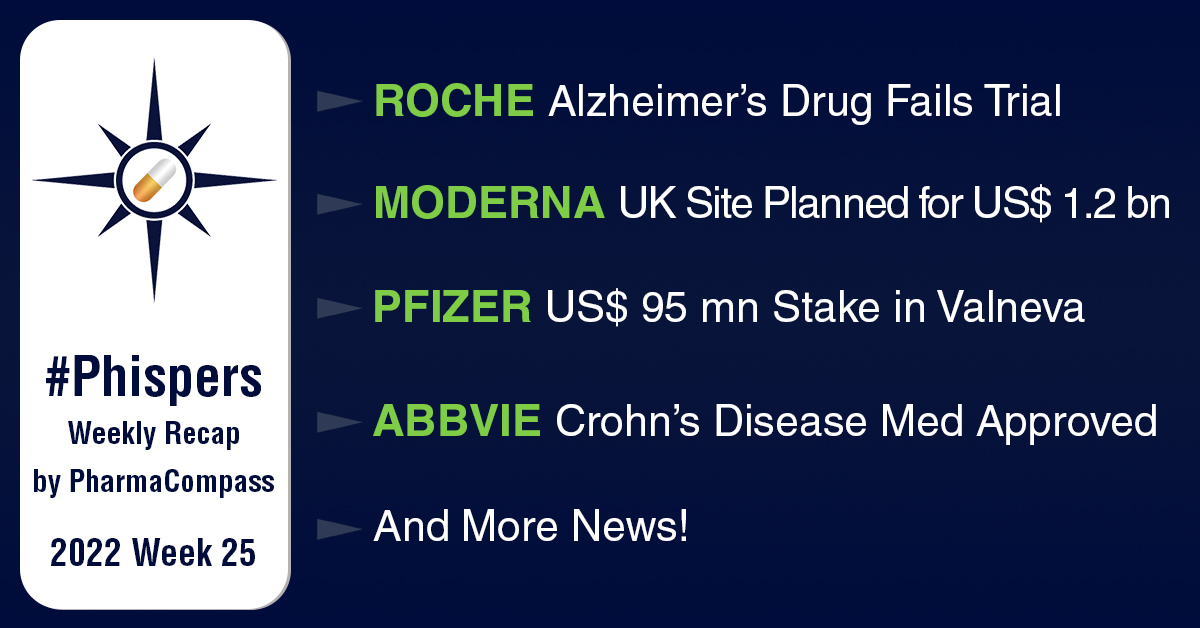
By PharmaCompass
2022-06-23
Impressions: 1,801 Article
In this week’s Phispers, we bring you news that Pfizer has agreed to buy an 8.1 percent stake in French vaccines company Valneva for €90.5 million (US$ 95.24 million) as part of a partnership to tackle Lyme disease. Merck is planning to buy Washington-based biotech Seagen to boost its cancer drugs portfolio, the Wall Street Journal reported.
In a major setback to Roche, its experimental Alzheimer’s drug candidate crenezumab has failed to meaningfully slow or prevent cognitive decline in people at risk of a rare, inherited form of the disease. And rare disease drugmaker Acer has received a complete response letter (CRL) for its drug candidate to treat urea cycle disorders. The FDA said it could not complete an inspection as the third-party contract packaging facility was not ready for inspection.
The US Food and Drug Administration (FDA) has approved AbbVie’s blockbuster drug Skyrizi (risankizumab-rzaa) as a treatment for adults with moderate-to-severe Crohn’s disease. Skyrizi is the first specific anti-interleukin 23 (IL-23) monoclonal antibody to treat Crohn’s disease. The agency has also approved Merck’s pneumococcal vaccine Vaxneuvance for children aged six weeks to 17 years.
In court news, a US appeals court has reversed its January decision to rule that a patent related to Novartis’ blockbuster multiple sclerosis drug Gilenya is invalid. The ruling has paved the way for cheaper generic versions to hit the market. And India’s investigating agency Central Bureau of Investigation (CBI) has alleged that Biocon Biologics officials had agreed to pay an Indian drug regulator about US$ 11,500 to waive a phase 3 study of Insulin Aspart injection that is used to treat Type 1 and Type 2 diabetes. The CBI has arrested the regulator, along with Biocon associate vice president Praveen Kumar and three others.
In manufacturing news, Moderna is planning to establish a research center and manufacturing site to develop its messenger RNA vaccines. The deal will be worth US$ 1.2 billion (£1 billion). Takeda has also secured a 600,000 square-feet of R&D and office space at Cambridge’s Kendall Square. And AstraZeneca plans to construct a production and supply base as well as a regional headquarters at Qingdao in China’s eastern Shandong province.
Pfizer to buy 8.1 percent stake in Valneva to advance Lyme disease vaccine
This week, Pfizer said it will buy an 8.1 percent stake in French vaccines company Valneva for €90.5 million (US$ 95.24 million) as part of a partnership to tackle Lyme disease. Pfizer will buy the stake in Valneva at a price of €9.49 (US$ 9.98) per share via a reserved capital increase. Valneva plans to use the amount to support its phase 3 Lyme disease development program.
The two pharma firms also updated the terms of their agreement that they had announced in April 2020 for Lyme disease vaccine candidate VLA15. Pfizer plans to begin the phase 3 study of VLA15 in the third quarter of 2022.
As part of the deal, Valneva will now fund 40 percent of the remaining shared development costs compared to 30 percent before. The US pharma giant will pay Valneva royalties between 14 percent and 22 percent. The royalties will be complemented by up to US$ 100 million in milestone payments.
Roche’s Alzheimer’s drug fails to slow or prevent cognitive decline in clinical trial
Recently, Roche suffered a setback when its ‘breakthrough’ cancer immunotherapy drug failed to slow progression of lung cancer in multiple trials.
Now, in another blow to the Swiss pharma, its experimental Alzheimer’s drug candidate crenezumab has failed to meaningfully slow or prevent cognitive decline in people at risk of a rare, inherited form of the disease. While small numerical differences favored crenezumab, the effects are not statistically significant, Roche said. The Basel-based pharma plans to share initial data from the trial at the Alzheimer's Association International Conference in early August.
The drug was discovered by Swiss drug developer AC Immune. Roche is carrying out the development of crenezumab via a license agreement. In 2019, the drug had failed a pair of phase 3 trials evaluating its use in the early stages of Alzheimer's. Roche’s another Alzheimer's drug – gantenerumab – is in a late-stage trial. The result from the trial is expected later this year.
AbbVie’s blockbuster drug Skyrizi clinches third nod to treat adults with Crohn’s disease
The US Food and Drug Administration (FDA) has approved AbbVie’s blockbuster drug Skyrizi (risankizumab-rzaa) as a treatment for adults with moderate-to-severe Crohn’s disease. With the approval, Skyrizi has become the first specific anti-interleukin 23 (IL-23) monoclonal antibody to treat Crohn’s disease. Crohn’s disease is characterized by inflammation in the gastrointestinal tract that can cause diarrhea and abdominal pain.
The FDA decision is based on three trials where Skyrizi outperformed the placebo in endoscopic response and clinical remission. In January, the FDA had approved the drug for adults with active psoriatic arthritis. The drug is also approved to treat plaque psoriasis. Skyrizi generated US$ 2.5 billion in revenue in 2021. According to analysts, the drug could fetch up to US$ 7.5 billion for AbbVie by 2025.
FDA issues CRL to rare disease drugmaker Acer as packaging facility fails to be ready for inspection
Rare disease drugmaker Acer has received a complete response letter (CRL) for ACER-001 (sodium phenylbutyrate) – its drug candidate to treat urea cycle disorders. Acer is developing the drug in partnership with Geneva-based partner Relief Therapeutics.
The FDA pointed out issues at the drug’s manufacturing facility as the reason for the rejection. The agency said its field investigator could not complete an inspection as the third-party contract packaging facility was not ready. It has asked Acer to inform the agency when the facility is ready for inspection.
Acer said the agency has also requested it for additional existing nonclinical information. The biotech, however, said the request for additional data was “not an approvability issue” and that the agency did not cite any other issues in the CRL. The pharma said it is coordinating with its contract packaging manufacturer and cooperating with the FDA. It plans to resubmit the New Drug Application (NDA) for ACER-001 to the agency in the next quarter.
Back in 2019, the biotech had received a CRL for celiprolol to treat vascular Ehlers-Danlos syndrome. The agency had requested an “adequate and well-controlled trial” for the candidate. The drug candidate has not been approved so far.
US court rules Novartis’ multiple sclerosis drug patent invalid, paves way for generic rivals
A US appeals court has ruled that a patent related to Novartis’ blockbuster multiple sclerosis drug Gilenya is invalid, paving the way for cheaper generic versions to hit the market.
The appeals court handed down the ruling in a 2-1 vote to reverse its January ruling where it had handed Novartis a win. The Swiss pharma giant had sued private Chinese drugmaker HEC Pharma after it filed for an FDA approval to bring out a generic form of Gilenya (fingolimod). Following the ruling, Gilenya could lose years of patent protection in the US. The patent is related to a specific dosage of Gilenya to treat relapsing multiple sclerosis.
Gilenya brought in US$ 2.8 billion in sales for Novartis in 2021, making it the Swiss company’s third highest-selling drug. Novartis said it will file a petition to seek further review of the appeals court’s decision. It said HEC and others cannot launch generic versions of Gilenya during the ongoing appeal process. Apart from HEC Pharma, Novartis has settled litigation with other generics developers, allowing them to launch on an agreed date.
Novartis, Precision ink potential US$ 1.5 billion deal: Novartis has entered into an in vivo gene editing research and development partnership with North Carolina-based Precision BioSciences. The two companies will work to develop a potential cure for hemoglobinopathies such as sickle cell disease and beta-thalassemia.
Novartis will pay US$ 75 million upfront. Precision will also be eligible for up to US$ 1.4 billion in milestone payments, along with research funding and tiered royalties. Under the deal, Precision will develop a custom ARCUS nuclease and run in vitro studies. Novartis will handle all subsequent research, development, manufacturing and commercialization operations.
Biocon Biologics denies allegations of bribing Indian regulator to waive diabetes drug’s phase 3 trial
India’s premier investigating agency Central Bureau of Investigation (CBI) has alleged that Biocon Biologics officials had agreed to pay an Indian drug regulator about US$ 11,500 to waive a phase 3 study of Insulin Aspart injection that is used to treat Type 1 and Type 2 diabetes. The CBI has arrested the regulator, along with Biocon associate vice president Praveen Kumar and three others.
Biocon denied the allegations, saying it follows all due regulatory process for its product approvals. “We strongly deny the allegations of bribery against the company and its officials associated with the approval process of one of our products in India,” it said.
The CBI has alleged that Guljit Sethi, who acted as a go-between for Biocon, conspired with company officials to bribe the joint drugs controller of Central Drugs Standard Control Organization S. Eswara Reddy for recommending that the trial be waived. Reddy had made the recommendation last month. Reddy, along with the Dinesh Dua, the director at Synergy Network India Private Limited, were arrested while receiving a part of the bribe.
Biocon’s s Insulin Aspart injection has received marketing authorization from Health Canada and the European Medicines Agency.
Merck considers buying cancer drugmaker Seagen, report
Merck is planning to buy Washington-based biotech Seagen to boost its cancer drugs portfolio, the Wall Street Journal reported, citing people familiar with the matter.
Merck and Seagen have been in talks about the buyout for some time, but a deal is not imminent due to the risk of a regulatory challenge, the Journal reported. The companies could eventually opt for a marketing agreement instead, the report added. If the deal goes through, it will be one of the largest deals in the recent past. According to Refinitiv data, Seagen’s market value is around US$ 27 billion.
Merck already has a stake in Seagen. In 2020, it had bought five million shares of Seagen for US$ 1 billion. It also paid US$ 600 million upfront for Seagen’s LIV-1-targeting antibody-drug conjugates (ADCs). The two pharmas have also inked several partnerships.
Merck’s pneumococcal vaccine approved for kids: The FDA has approved Merck’s pneumococcal vaccine Vaxneuvance for children aged six weeks to 17 years. The 15-valent vaccine is the third pneumococcal shot to be approved for children. The agency had approved the vaccine for use in adults in July 2021.
Vaxneuvance’s approval in kids and adolescents is based on data from seven clinical studies that compared the vaccine to Pfizer’s Prevnar 13. Merck’s shot covers the 13 strains along with two additional ones.
The approval has given the New Jersey-based pharma a running start on its pneumococcal vaccine rival Pfizer, which is planning to get its new 20-valent pneumococcal vaccine approved in children. Prevnar 20 is approved for use in adults, but it is still in clinical trials for kids.
Moderna plans UK vaccine research center and manufacturing site for US$ 1.2 billion
Moderna is planning to establish a research center and manufacturing site to develop its messenger RNA (mRNA) vaccines. A Financial Times report said the site will manufacture up to 250 million doses per year. The deal will be for US$ 1.2 billion (£1 billion) and will last 10 years. It is slated to be finalized this summer. Construction is expected to start later this year, and the first vaccines are to be produced in 2025.
Takeda’s Cambridge, MA, hub to house R&D center: Takeda has secured a 600,000 square-feet of R&D and office space at Cambridge’s Kendall Square. According to the company, the facility will allow it to create a purpose-built R&D facility with upgraded technology to support its efforts. Construction of the new facility is expected to begin next year. The company will have a base lease term payment of US$ 1.48 billion to be paid over 15 years.
Astra plans base in China’s port city: As part of its plan to expand in China, AstraZeneca plans to construct a production and supply base as well as a regional headquarters at Qingdao in China’s eastern Shandong province. The facility will also house an innovation center focused on rare diseases, a life science innovation park and an industrial fund. It will produce the ingredients for Breztri, a therapeutic that treats COPD.
The PharmaCompass Newsletter – Sign Up, Stay Ahead
Feedback, help us to improve. Click here
Image Credit : Phisper Infographic by SCORR MARKETING & PharmaCompass is licensed under CC BY 2.0
“ The article is based on the information available in public and which the author believes to be true. The author is not disseminating any information, which the author believes or knows, is confidential or in conflict with the privacy of any person. The views expressed or information supplied through this article is mere opinion and observation of the author. The author does not intend to defame, insult or, cause loss or damage to anyone, in any manner, through this article.”






